Effective Ways to Get Rid of the Mildew Smell In Your Rental
Our current rental home is located in coastal North Carolina, where we have hot, humid weather for much of the year and are often in the path of tropical storms and hurricanes. So it might not be all-that-surprising that we noticed a strong mildew smell the second we walked into the house for the first time. Today, I’m sharing the renter-friendly ways we’re combatting the moisture and humidity in order to reduce the smell and improve our air quality!
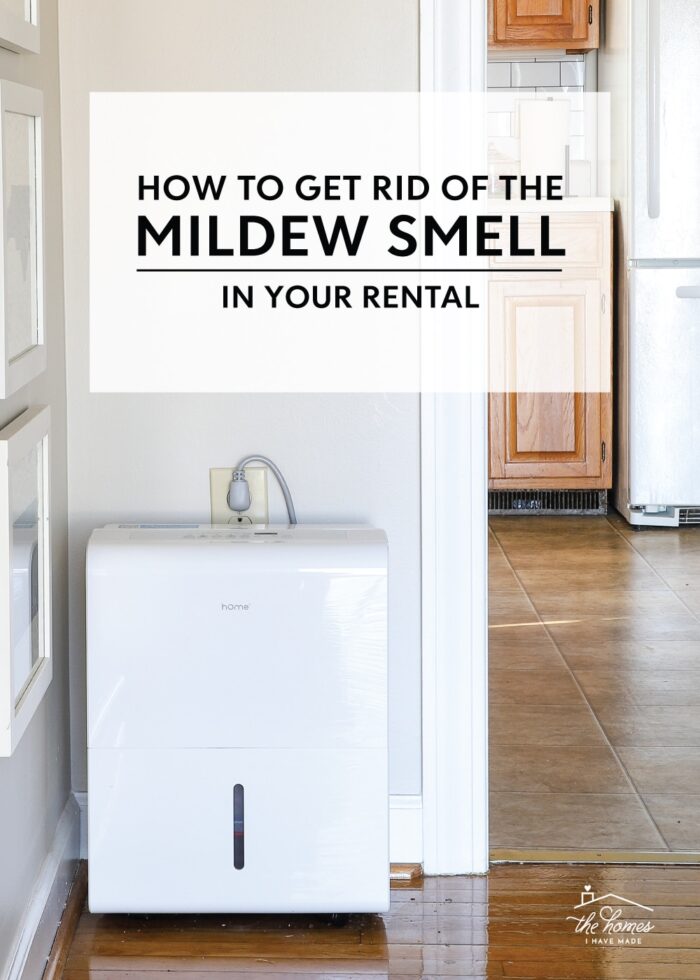
Old Homes In a Humid Environment
The historical 2-story homes aboard Camp Lejeune are somewhat “known” for having water-related issues. Beyond simply being 70+ years old, they have not received the necessary modern-day improvements required to effectively combat the exceptionally moist climate. Add to that: damage caused by a few significant natural disasters (e.g., Hurricane Florence); and some of these homes have their share of mold, mildew, and other moisture-related issues (e.g., condensation, wet walls, etc).
I am not going to dive into the (very) sensitive discussion of why military families are exposed to, expected to, or choose to live in these homes and what our management company is (or is not) doing regarding the moisture problems. Rather, I’m just calling a spade “a spade” here and acknowledging that yes…these homes generally have moisture issues that…if and when we choose to live here…we have to primarily deal with on our own.
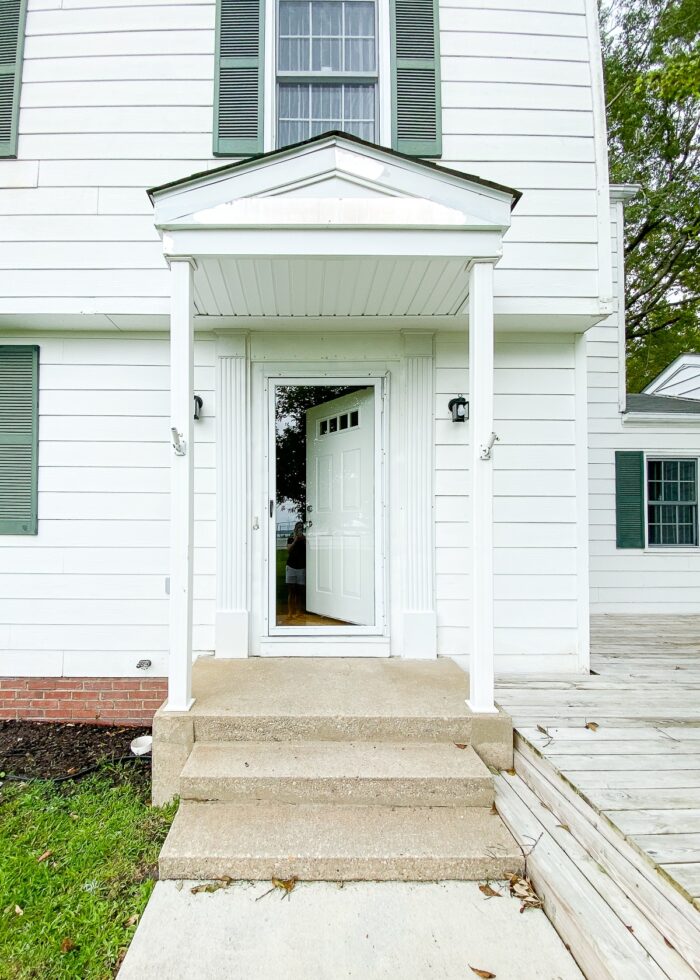
Our House Smells!
Our particular house did not sit empty for long before we moved in (maybe just a few weeks). It wasn’t abandoned, nor did it go months or years without occupants. So even though I was well aware of the moisture issues in these homes, I was quite surprised at how strong the mildew smell was when I first walked into the freshly painted, newly-cleaned house.
Even a few months in…after placing rugs, burning candles, and opening windows…the house still had that “wet” scent every time I walked in the door.
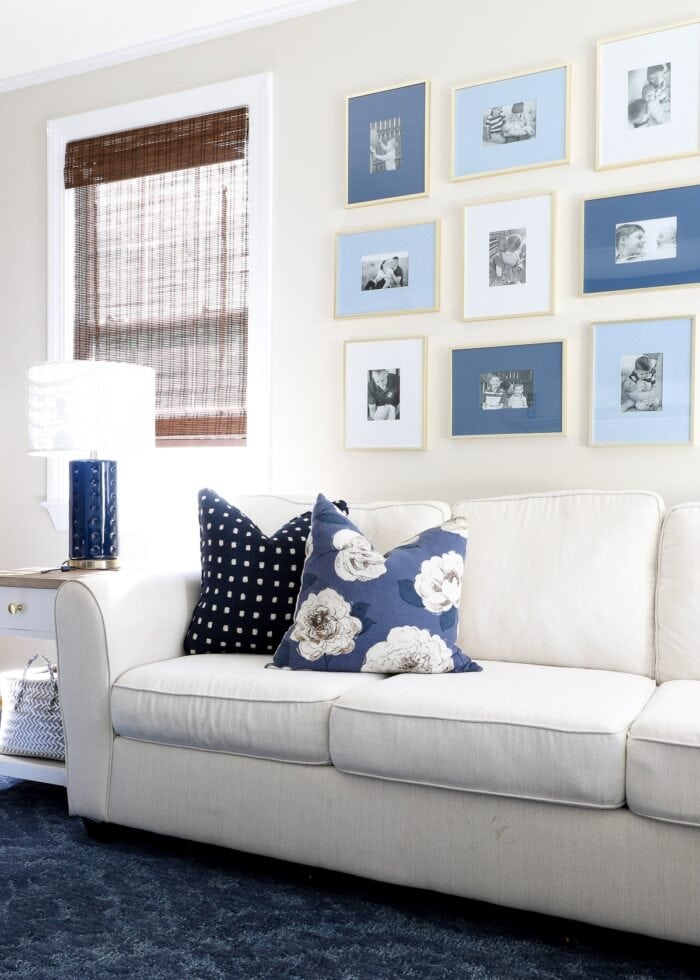
What Causes a Mildew Smell In a House?
Water Damage
Quite often, when you smell water, there’s a very good chance there either is or was water damage to the property that has not been fully removed. This could be water leaks on carpet, fabrics, drywall, ceilings, and even inside cabinets and drawers.
If the mildew smell is attributed to water damage, the only way to completely eliminate it is to remove these items from the home.
TIP! As a renter, you are likely not going to deal with water damage on your own. If you suspect the odors in your home are attributed to water damage, ask the owner or property manager to explore the source of the smell further and mitigate it appropriately. Always consult your lease to determine your rights and leverage in this situation.
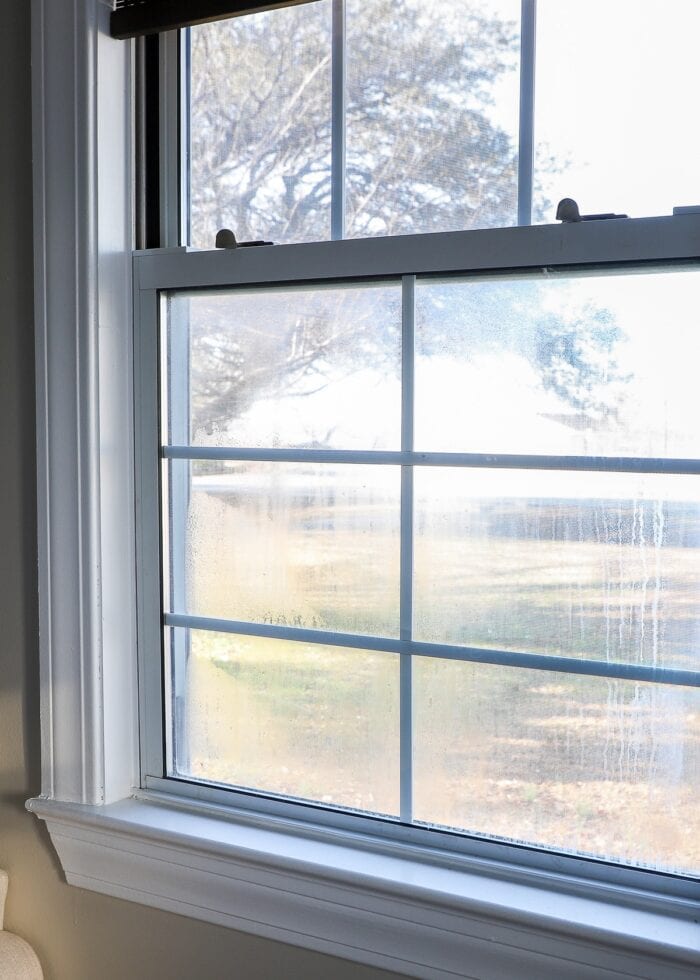
Moist Air
That said, even if there isn’t overt water damage to a property, excessive humidity can also lead to a “wet” smell in a home if proper ventilation and circulation measures aren’t taken.
Additionally, if you live in a humid climate or water-facing home (like we do!), you will likely need to take extra measures to reduce the “sitting” moisture in your home (e.g., dehumidifier). I share a bunch of solutions for reducing humidity further down in this post!
When To Suspect Mold
Just because your house smells wet doesn’t necessarily mean there is mold growing…but it might! Mold exposure poses a serious health risk (e.g., allergies, asthma) and should be taken seriously. Here are some indications that you might indeed have mold growing, which absolutely warrants further investigation by your owner or property manager.
- Visible signs of mold spores
- Breathing problems or constant sickness such as stuffy nose, headaches, nausea, fatigue, itchy eyes, dizziness while inside the property
Appliances
Finally, sometimes a mildew smell can be attributed directly to an appliance, typically the rubber gasket of a front-load washing machine or dishwasher. In these instances, you will only notice the smell when in close proximity to the unit.
These specific smells are usually remedied by scrubbing the moldy area with bleach and a sponge or running a special cleaning solution through the wash cycle.
How to Get Rid of a Mildew Smell in a Rental
As renters, we obviously can’t carve open dry wall or rip out flooring to find the odor-causing culprits. So there are two primary solutions for eliminating (or at the very least, reducing) the mildew smell in a rental home (beyond asking your management to investigate):
- Reduce the home’s humidity level, which will in turn reduce the “wet” smell
- Combat the strong odors with more pleasant-smelling alternatives
Let’s dive into some practical solutions for each of these!
Reducing a Homes’s Humidity Level
Whether you suspect water damage or just live in an exceptionally moist climate, reducing the home’s humid air is the best way to reduce the mildew smell (and improve the air quality as a result)! Here’s how:
Improve House Insulation
If your home is in a humid, wet climate (like ours), it’s imperative that you seal it up as best you can. There is no point in using the other scent-saving measures listed below if you’re continually allowing new moisture to seep its way in.
As such, check all the windows and doors for good, tight seals that will keep moist air out.
Doors. Add weather stripping or new door sweeps to ensure moisture and water can’t get in. You can even install your own storm door for added insulation if your property manager approves it.
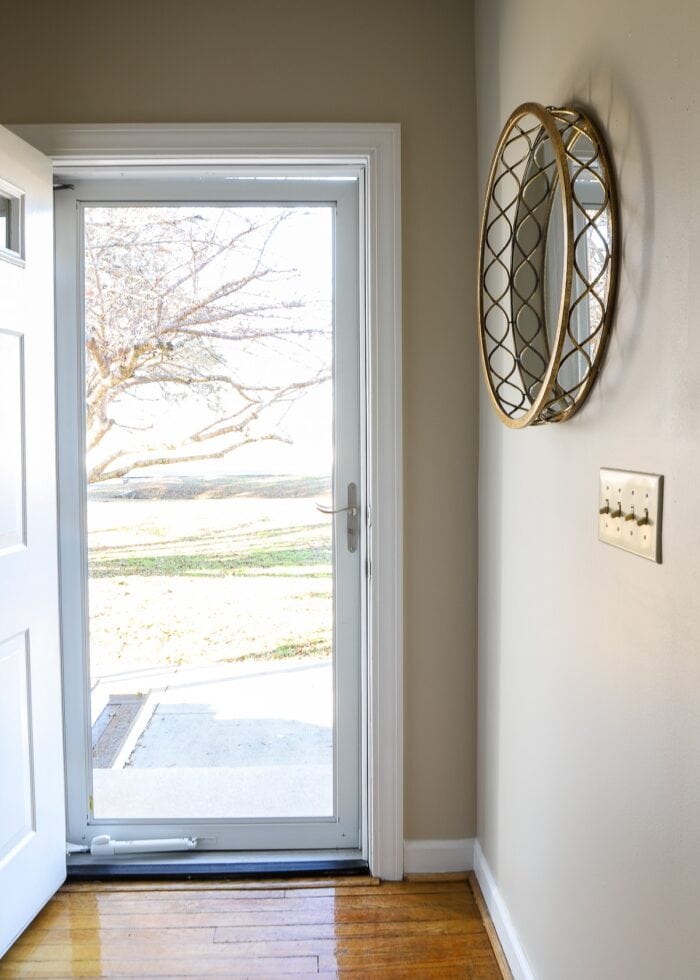
Windows. Caulk around window frames or add protective film to ensure a tight seal (this helps keep out the cold in winter too!)
Fireplace. If a fireplace is not properly vented, water can enter the top of a chimney and stick to the sides of the flue walls. If you suspect your chimney might be the cause of humidity/odor, ask your landlord to assess the venting. Alternatively, you can put a Fireplace Blocker in front of the fireplace to block odors from entering the house (this also helps with drafts!)
Vents. Finally, ensure all your air ducts and vents are cleaned regularly, as they help move the moist air already in your home to the outside. If these vents are clogged, the humid air can become trapped in your home, which will only continue to add to the musty odor.
TIP! Check your lease or rental agreement; vent maintenance is likely covered by the owner or property management company!
Run the Air Conditioner…All the Time
Continually running the air conditioner is one of the most effective ways to reduce humidity in your home (and therefor, reduce the smell that comes with it). Although I don’t quite understand the full process, the air conditioner essentially takes in the humid air, cools it by sucking out the water, and then pushes the dehumidified air back into your home.
Use Dehumidifiers
Constantly running the air conditioner can act as a dehumidifier; but if you’re still smelling a musty smell, you likely have lingering moisture that the air conditioner isn’t resolving. Investing in dehumidifiers may be warranted, especially for homes in very humid climates.
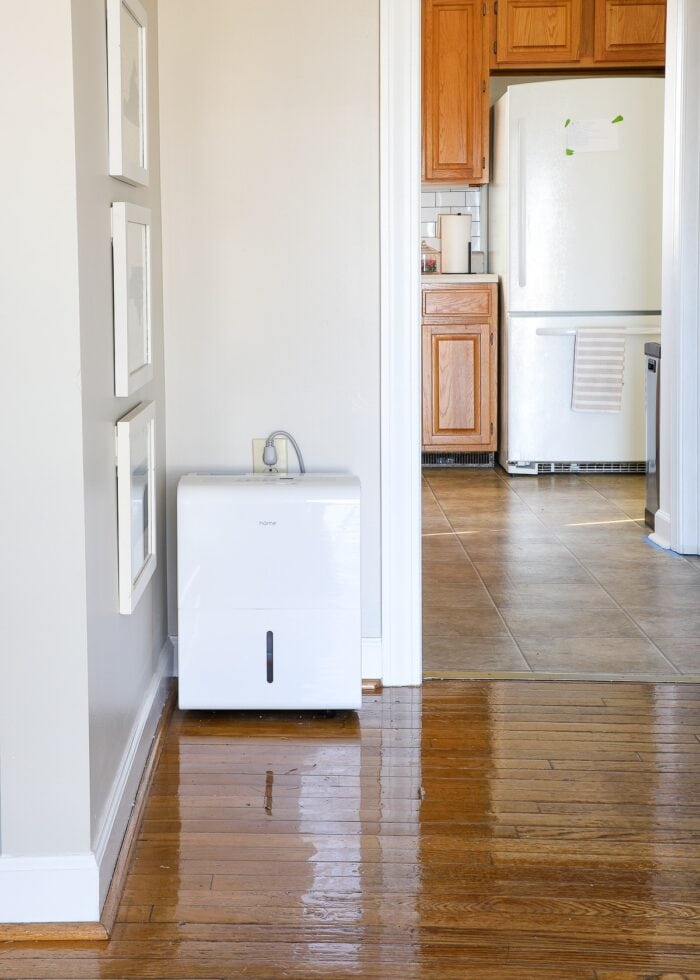
When selecting a dehumidifier, keep these things in mind:
- Pay attention to the amount of square feet the unit can accommodate and place it accordingly.
- Consider placing the dehumidifier in a central location within each floor (e.g., dedicated units for first floor, second floor, basement, etc).
- Use smaller dehumidifiers in areas where there is poor air circulation (e.g., bathrooms, closed-off bedrooms.
We purchased this large 1,500 square foot dehumidifier for the center of our first floor. We have it set to maintain a particular humidity, and it runs almost constantly.
We then also placed a small single-room dehumidifier in our son’s bathroom, which has the worst smell in the house and is also the most closed off from good air flow. (He likes it because it has cool color-changing lights!)
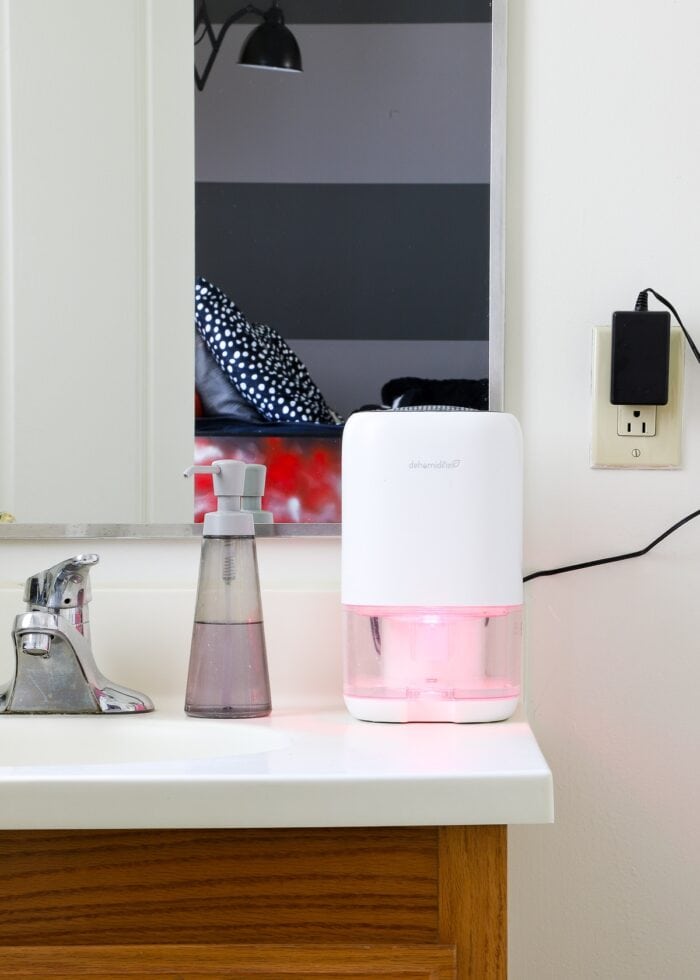
TIP! Good quality dehumidifiers can get expensive. Shop for these high-ticket items on Black Friday or during the Amazon Prime Day events, where big-name brands tend to be marked down significantly.
Keep Air Circulating
Stagnant air can cause higher levels of humidity in your home (which then can lead to the stink). When possible, keep interior doors open and ceiling fans running so that air circulates freely.
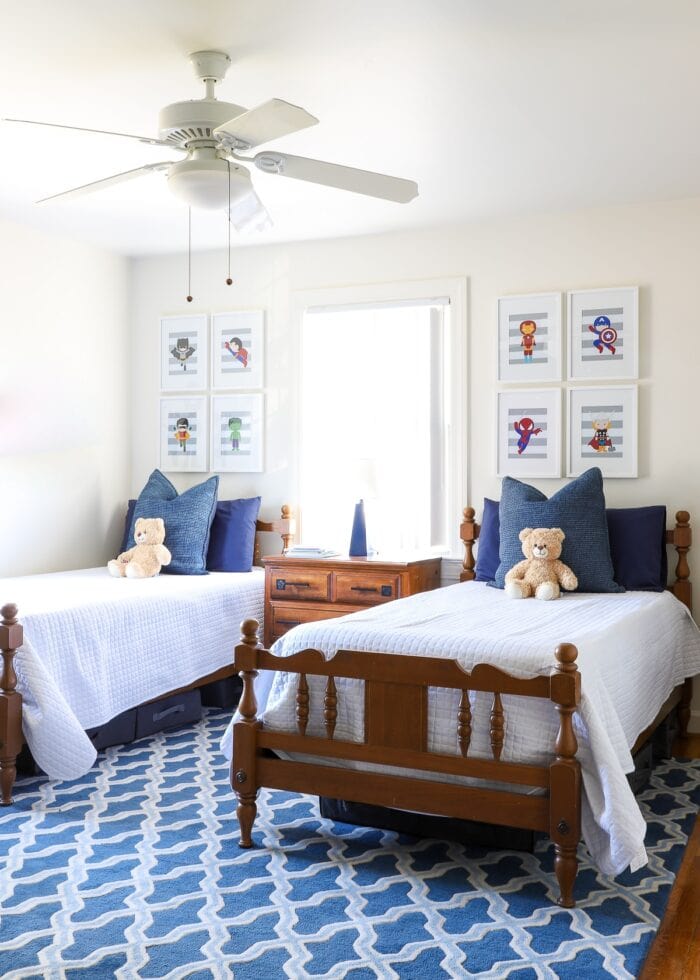
Absorb Water In Small (Humid) Areas
Because poor air flow can cause that musty smell to build up, it’s important to address cramped areas that trap moisture such as closets, cabinets, drawers, and small window-less rooms (e.g., bathrooms, laundry rooms).

Damp Rid bags/tubs and activated charcoal bags are a great way to collect moisture in these areas, especially those too small for dehumidifiers or without power outlets.
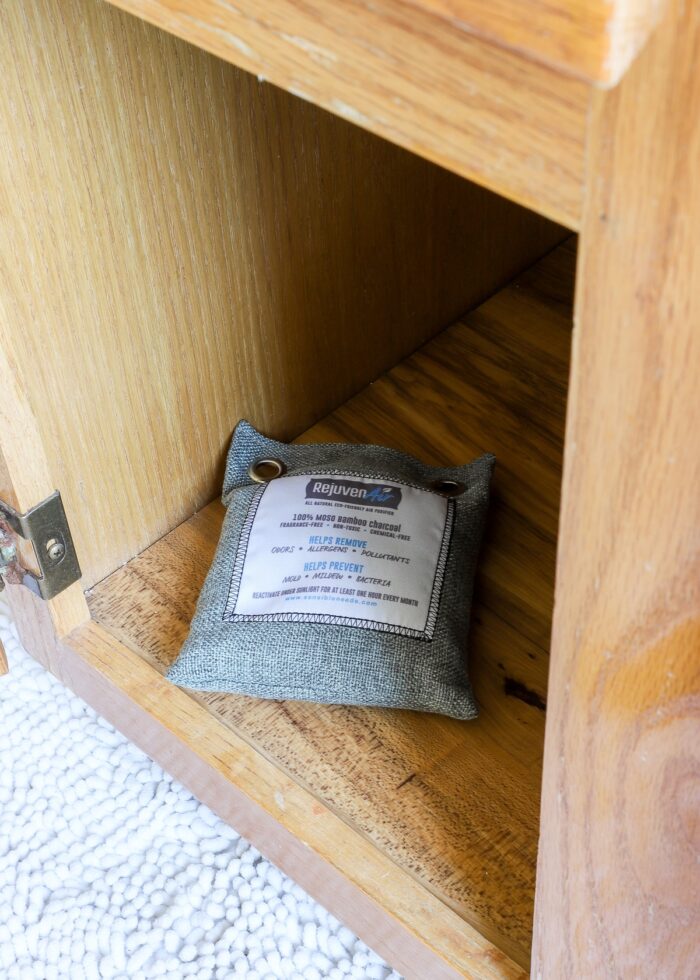
Limit Moisture-Producing Activities
Any hot water activities in the home produce steam, which then produces excess moisture. If the humidity issues in your home are really excessive, you might want to reduce the time using the shower, dryer, steam cleaners, or dishwasher.
TIP! Ensure that any appliances that use venting (e.g., oven, dyer) are setup properly so that the hot air is exiting the home.
Combatting Strong Mildew Odors
Even if you’re making all the efforts to reduce the humidity in your home, you might still feel like you have lingering smells. Once you’ve implemented the above, you can also try to eliminate or replace the odors you’re still smelling. Here’s how:
Use an Air Purifier
Air purifiers are the most efficient way to improve the air quality in your home. While they won’t reduce moisture (the way dehumidifiers do), they can trap mold spores (from the air) and eliminate other air impurities that cause odors.
Beyond just for smell control, we have these air purifiers in our kids’ bedrooms since they all suffer from allergies. (This is another item to purchase during Amazon Prime Day/Black Friday, as they are typically deeply discounted!)
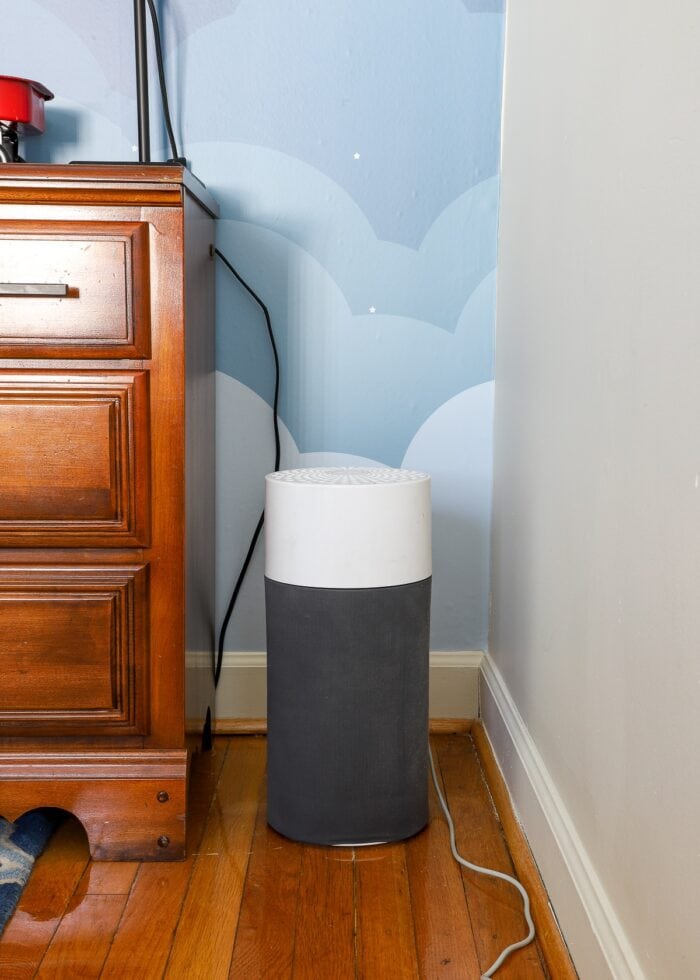
Purify with Plants
Certain plants are known to be natural air purifiers (and they’re a fantastic home decor accessory too!) Fill your home with air-cleansing plants of all sizes. Place them in as many rooms as possible, but especially in areas where you feel the smell is the strongest.
Not sure which plants are the best for your air? Here is a list I reference all the time!
TIP! Overwhelmed in the plant section? Me too! So I bought this bundle of air-purifying plants from Amazon. Not only was I sure to get a great selection of plants known for their air-improving properties, but they arrived right on my doorstep ready to drop into pots!
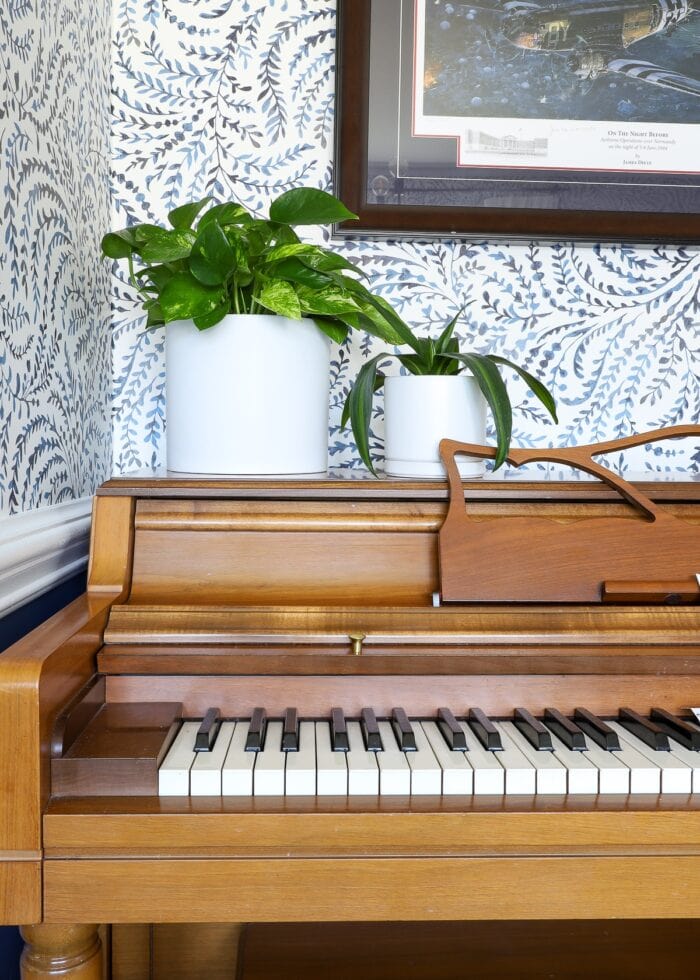
Use Natural Cleaners
Natural cleaners such as baking soda, white vinegar, and bleach can work double-duty in your home. Not only do they disinfect surfaces but they can also help absorb bad odors. Try swapping out your regular cleaning spray bottles to these odor-absorbing power houses for your daily cleaning needs!
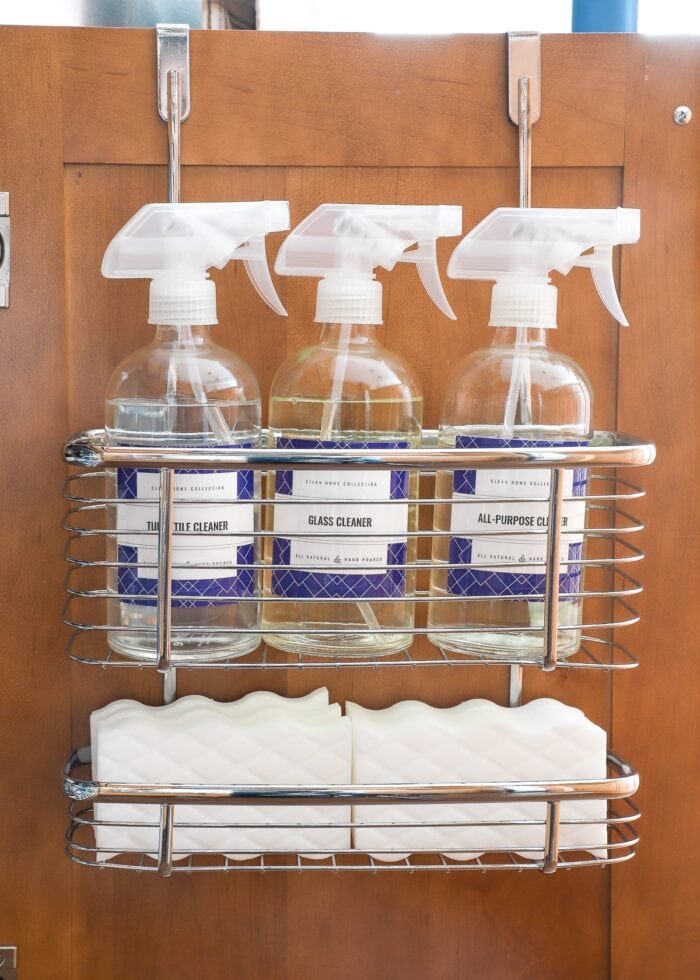
Add a Scent You Love
Last but not least, try to mask the moldy smell with one you love. I personally found that diffusers with essential oils were insufficient in creating a strong enough smell that overpowered the wet scent. As such, we now use these quite strong (yet super yummy smelling) wax melts to distract our nostrils!
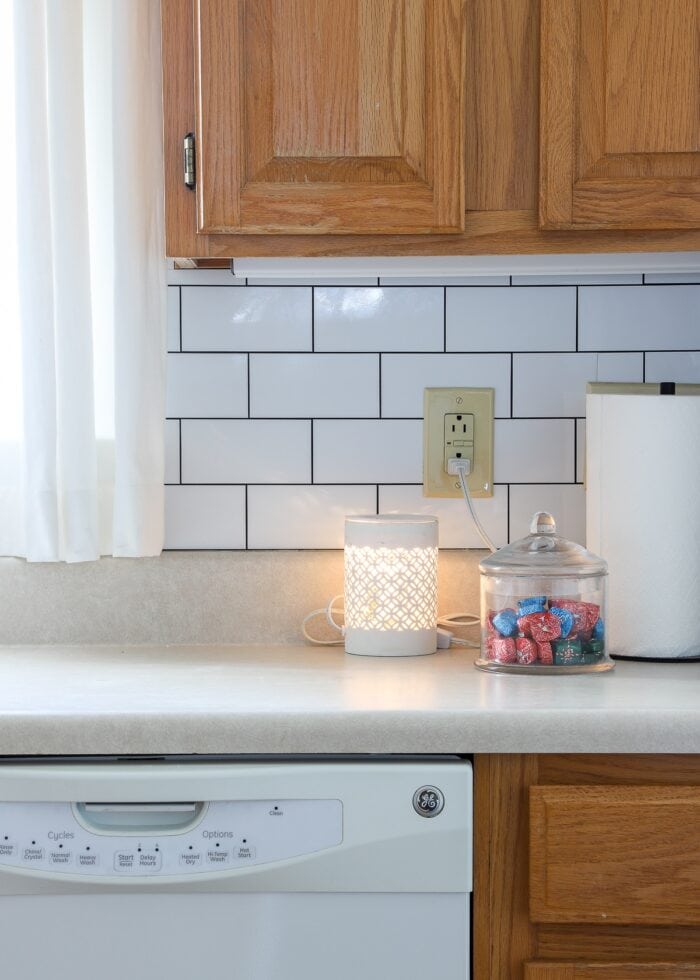
My Mildew Odor-Fighting Favorites
Here are the items we’re relying on to reduce the mildew smell in our coastal Carolina rental home!
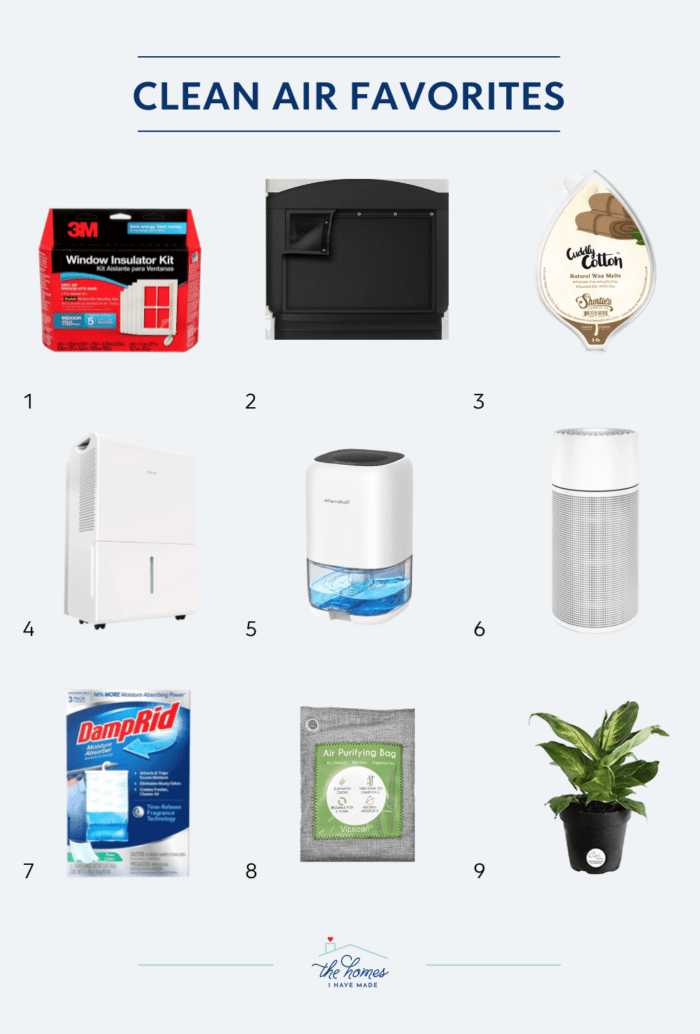
1 – 3M Window Insulation Kit | 2 – Fireplace Blocker | 3 – Shortie’s Wax Melts | 4 – HomeLab 1,500 sqft Dehumidifier | 5 – Single Room Dehumidifier | 6 – Blueair Air Purifier | 7 – Damp Rid Bags | 8 – Activated Charcoal Bags | 9 – Air-Purifying Plants Bundle
Is It Working?
For 3+ months now, we’ve been running the dehumidifiers, nurturing our air-purifying plants, collecting water in closets, burning our wax melts, and systematically working around the house to close off any sources of excess moisture. And yes…I do believe it’s all helping! (I realize you can’t smell through the screen, so you totally have to trust me on it!)
The “wet” smell is not nearly as strong as it was on day one; and I at least feel better knowing that we are being proactive with the humidity in order to prevent any severe issues from popping up.

While getting to the root “cause” of the wet smell in your home is ideal, that can often take a lot of time, money, and resources that you (or your landlord) may or may not have. Hopefully, what I’ve shared here today helps you curb the odor and improve the quality of the air you smell and breath throughout your home!
Megan


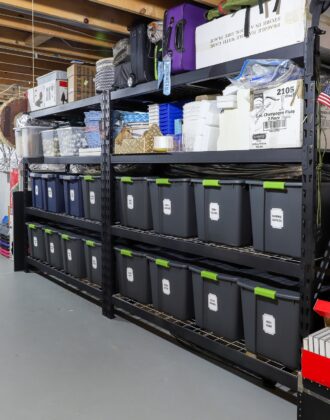
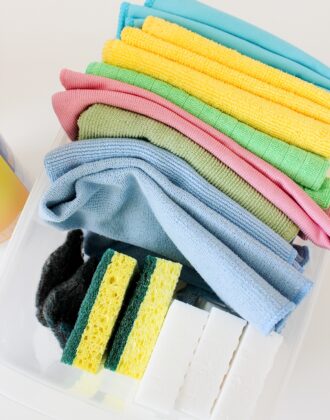
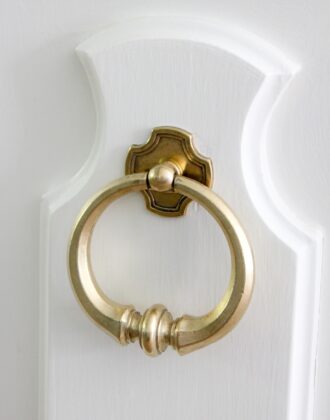
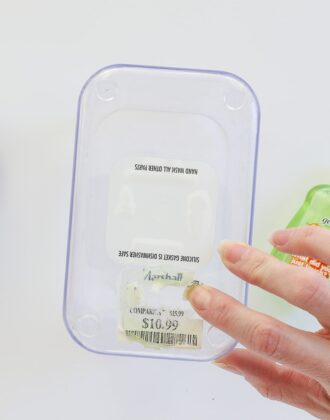

8 Comments on “Effective Ways to Get Rid of the Mildew Smell In Your Rental”
Check out Concrobium products to combat mold; it supposedly works better than bleach to kill mold spores. We have liked it a lot.
So useful. Especially the info on buying the expensive items on black friday/prime day. Smart! Something I didn’t realize is make sure air can circulate behind furniture/bookshelves/etc. If it can’t get back there, it can mold. That is the extent of mold I have to deal with. Beyond that living in a desert causes the opposite problems. Constant dry skin and hair!
Megan, you are incredible. Time and time again, you’ve been uprooted, with 3 kids, and you’ve consistently made lemonade out of lemons.
Does your husband realize what a goddess you are?
I salute you!
I live on the lake in Maine, in a basement apartment. It was awful when I first moved here. I bought a whole house Humidex system. It’s a small apartment but it works great. It’s eleven years & still running. Was quite expensive at $1283.00 but worth it. No smell in all these years. Electric wasn’t affected much at all.
Hi Loretta!
Thank you so much for sharing this solution! Quite an investment indeed, but I can see how it would be VERY worth it, considering your climate! I’ll definitely be keeping this one in mind!
~Megan
Did the personal dehumidifier actually work? The one I ordered from Amazon….not the one you purchased was worthless. I may have to bite the bullet and pay more than $60 for a “real one”. I wanted a small one for an RV bathroom as our employee will be showering there every day and it will get wet quickly.
Hi Nikki!
We’ve been very happy with the little one so far! It fills up fairly regularly, and it’s easy enough for my son to empty on his own. And the smell in my son’s room is much improved!
Hope that helps a bit!
Megan
I would like to echo the use of Concrobium products as more effective than bleach. We first heard about them from a regular handyman radio show years ago. Also Nok-Out is a very effective odor eliminator if applied to the source of the odor. It was recommended by Everyday Cheapskate.